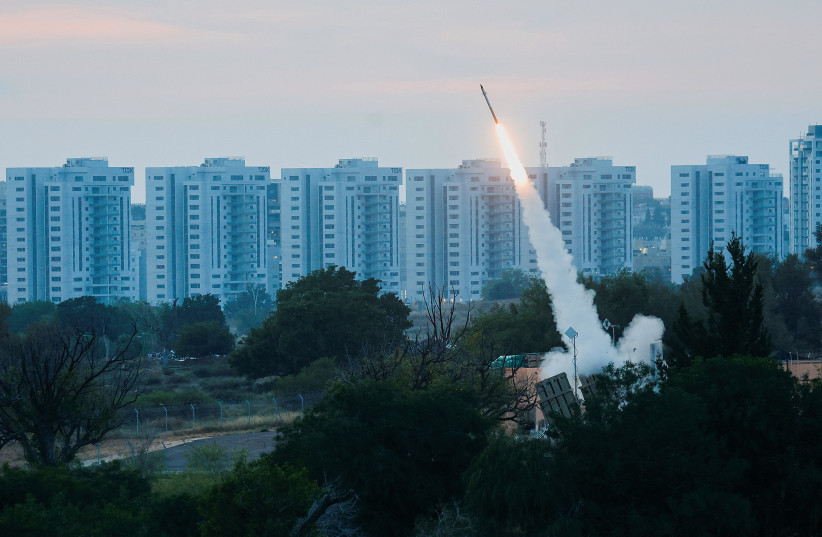Since 2021, a year before Russia’s 2022 invasion of Ukraine, Kyiv and portions of the US political class have been pushing for either Israel or the US to sell the Iron Dome to Ukraine.
Whether the latest attempt last week to get the Iron Dome to Ukraine by some US senators goes through or not, the impact on Israel and on Ukraine will be limited.
At an earlier stage in the conflict, when Moscow thought it might quickly squash Ukraine and when the West itself was slow to provide significant military aid, Jerusalem providing the Iron Dome to Ukraine might have been seen by Russian President Vladimir Putin as not just a tactical issue, but a strategic propaganda one.
He might have blamed Ukraine’s fighting back and the West’s eventual rise to support Kyiv due to significant weapons supplied by Israel.
Also, at the start of the Ukraine conflict, Russia’s S-300 anti-missile system was based in Syria to assist the Bashar Assad regime in its fight with rivals in that country.

One of Israel’s nightmares was that Russia would use or allow Syria to use the system to prevent it from striking Iranian proxies in Syria.
This would in turn have allowed Iran to set up a new missile threat on Israel’s Golan Heights border.
However, Putin has long since transferred the S-300 anti-missile system to Ukraine.
Likewise, the West has now been providing significant military aid to Kyiv for an extended period with minimal or no similar aid coming from Israel (which has provided some economic aid and limited defense aid).
Still, Jerusalem hopes to keep better ties with Russia than Putin has with the West. It views Russia as, at minimum, a regional power which it will need to contend with in the Middle East for decades to come.
Even without the S-300 system, Putin has aircraft in Syria that could make trouble for Israel’s aircraft striking Iranian proxies there. And having such an unpredictable regional power nearby means that one cannot always foresee what dangers might be in store if that power is alienated.
Last week, a senior US general told the US Senate that there was a process going on to consider providing one of America’s Iron Dome batteries to Ukraine.
Israel has remained mum on the issue, but The Jerusalem Post has learned that top Israeli defense officials are still concerned about upsetting Russia. Since the Iron Dome was a joint US-Israeli project, both countries need to agree for the system to be provided to Kyiv.
Despite its theoretical principled support for Ukrainian sovereignty against Russia’s invasion, in practical terms, Israel still does not view the benefit of providing the Iron Dome to Kyiv as outweighing the potential cost.
The benefit would be limited
First of all, the benefit would be limited. Even some Ukrainian officials have recognized that Ukraine’s huge territory and Moscow’s more sophisticated rockets (versus the low-technology Palestinian rockets the Iron Dome shoots down) make the defense tool of very limited use against Putin.
If Israel needs 10 or more Iron Domes to properly defend itself, Ukraine would need dozens or more, which simply do not exist. One or two Iron Domes from the US would make no difference tactically, and at this point, probably would not even make much of a symbolic difference. And even then, the Iron Dome might fail to shoot down Putin’s more sophisticated missiles.
In that sense, it is worth recalling that Prime Minister Benjamin Netanyahu himself implied Israel might provide the Iron Dome some months ago. Then that talk disappeared.
Israel's pressure on Russia
Most likely, Netanyahu was flexing his muscles at Putin to pressure Moscow not to give advanced weapons to Iran, in exchange for drones the Islamic Republic has sold Russia.
The US general was not speaking in practical terms, but was trying to escape looking like he and the US military were blocking helping Ukraine, as some US senators wanted. Even if the US muscled Israel into not opposing the transfer of one Iron Dome battery, it would make little difference.
So when hearing talk about providing some kind of new military help to Ukraine, it is important to look at all the dimensions and multi-sided audiences the speaker in question might be addressing.
After all the talk, when it comes to the Iron Dome, the most important thing to realize is that the issue is now far more symbolic than having much practical impact on either Israel or Ukraine.
